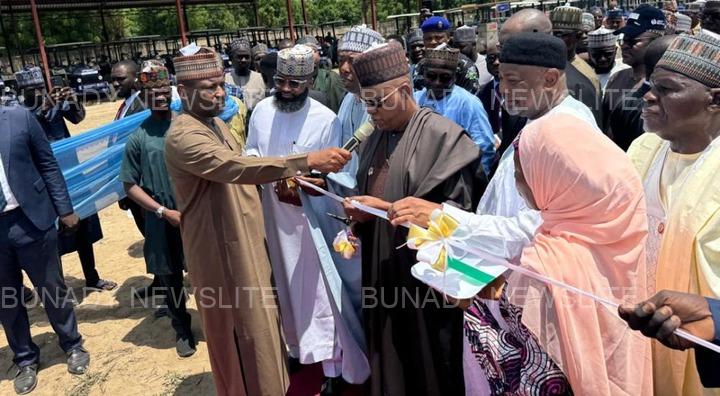The Vice President, Kashim Shettima, on Sunday, launched an asset restoration programme that will see Nigeria save over N10trn by restoring broken government equipment rather than replacing it with new ones.
The programme, led by the National Agency for Science and Engineering Infrastructure (NASENI), seeks to restore over 26,000 broken but serviceable heavy-duty machines and repurpose nearly 500,000 component scraps that have been lying idle across the country.
INDEED THE WORLD IS GOING TO END: Watch 3 Minutes Video of The Smallest Device That Can Destroy 75% of The World When It Explode In The Air.
Speaking during the launch at the Borno State Agricultural Mechanisation Farm Centre in Maiduguri, Shettima said the objective of the programme is to reduce waste, cut unnecessary spending, and power national development through localised innovation and sustainable asset management.
“For so long, we have been profiled as a nation with a poor maintenance culture. This dysfunction cuts across both the private and public sectors, and we owe it to ourselves to say: enough is enough,” said Shettima, who reaffirmed the Bola Tinubu administration’s commitment to building a productive, self-reliant, and diversified economy.
“This initiative is a response to our cross-generational dilemma about what to do with abandoned and poorly maintained assets of the nation, of the people. It’s a powerful shift in how we think about value, sustainability, and innovation.
“We must commend NASENI for stepping forward with this brilliant idea to mitigate a national tragedy.”
The VP, according to his spokesperson, Stanley Nkwocha, acknowledged NASENI’s contributions to national development through technology transfer, local engineering, and adaptive innovation, especially in areas such as compressed natural gas (CNG) retrofitting, renewable energy, and agricultural mechanisation.
“We can’t create durable Nigerian solutions to Nigerian problems unless we localise global technologies. Relevant agencies must be supported to point us towards a stable nation and a promising future.
“The direction NASENI is headed is one driven by action, impact, innovation, and awareness of what the nation needs,” he said.
VP Shettima also called for public cooperation in safeguarding the assets that will be restored, explaining that these resources belong to the Nigerian people.
“If we restore these vital assets, we must all protect them. These machines, these tools, and these technologies are the property of each of you—of each Nigerian. It’s your collective national inheritance,” he added.
The Executive Vice Chairman and Chief Executive Officer of NASENI, Mr Khalil Suleiman Halilu, revealed that the agency’s national survey found Nigeria holds over 47,000 broken-down or serviceable agricultural and law enforcement assets, with replacement costs exceeding ₦14trn.
However, he explained that these assets can be recovered for just 15 to 25 per cent of their replacement value while achieving full functionality.
“At NASENI, we asked a simple question. Why replacement when we can restore them? With the right engineering, the right people and the right partnership, we found that we can recover these assets for just 15 to 25 per cent of their replacement value and still achieve full functionality.
“That is over N10 trillion in national savings while restoring productivity, jobs and security on the ground. That is the power of engineering, and that is the promise of NASENI.
“This programme is one more step in our mission to keep innovation at the heart of governance, whether it is through clean energy, mechatronics or the domestication of advanced technologies. NASENI is showing that Nigerian problems can have Nigerian engineering solutions,” he said.
On his part, the Borno State Governor, Professor Babagana Zulum, who hosted the launch, noted that Nigeria requires a minimum of 750,000 functional tractors to meet its agricultural needs, yet less than 10 per cent of that number are currently operational across the country.
He recalled that during Shettima’s tenure as governor, the state procured 1,000 tractors and implements along with various other agricultural machinery, representing the largest agricultural machinery investment in the state’s history.
He said that according to the FAO’s recommended tractor density of 1.5 horsepower per hectare, “Here in Borno, our mechanisation drive has faced serious setbacks, especially following the devastating floods of September 2024, which damaged a significant number of our agricultural machines.
“That is why today’s intervention could not have come at a better time. The decision by NASENI to select Borno as the pilot state for the National Asset Restoration Programme is both strategic and timely. It offers us a lifeline to revive damaged assets and restore the capacity of our farmers to cultivate efficiently.
“Through the tireless efforts of NASENI and its technical partner, MECA, these machines are being brought back to life, and we appreciate their commitment to making this vision a reality.
“As a government, we are fully committed to ensuring that these restored assets are properly maintained and put to optimal use. We are putting in place a sustainable maintenance framework that promotes accountability, encourages local ownership, and ensures long-term functionality.”
The Minister of Agriculture and Food Security, Senator Abubakar Kyari, described the programme as a defining moment in efforts to bring productivity back to the core of public service delivery across sectors.
He noted that out of over 55,000 tractors estimated across the country, fewer than 10,000 remain operational.
After the launch, Shettima proceeded to Borno State University, where he commissioned a power infrastructure project executed by the Niger Delta Power Holding Company Limited.
The project, implemented under the Distribution Intervention Projects, includes a 1X7.5MVA, 33/11KV injection substation; 3km of 33KV line; 2.5km of 11KV line; 2.5km of LT line; and three 500KVA distribution transformers.
The event was attended by the Managing Director of Niger Delta Power Holding Company, Eng. Jennifer Adighije; Director General of Federal Radio Corporation of Nigeria, Dr. Mohammed Bulama; Senior Special Assistant to the President on Special Needs and Equal Opportunities, Hon. Mohammed Abba Isa; members of the Borno State Executive Council; and other government officials.
INDEED THE WORLD IS GOING TO END: Watch 3 Minutes Video of The Smallest Device That Can Destroy 75% of The World When It Explode In The Air.


